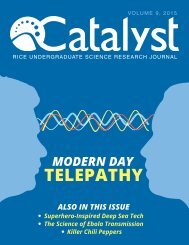You also want an ePaper? Increase the reach of your titles
YUMPU automatically turns print PDFs into web optimized ePapers that Google loves.
explain that were prominent changes
in both Openness and Neuroticism in
comparison to the baseline personality
traits that come up with long-term followup
traits that follow the MDMA-assisted
psychotherapy.
Based on the LTFU questionnaire for use
in LTFU evaluations of MDMA-assisted
psychotherapy, CAPS and IES-R scores at
LTFU for the 16 study completers from
Study 2 were not statistically different
from their 2-month (short-term) mean
scores (Table 3) illustrating similar
explanation and effects toward the
study. Throughout this study, all subjects
reported a benefit from participation in
the study (median = 5, range = 3), with
at least some benefit persisting (median
= 5, range = 3) for longer than a year
post-treatment. Moreover, the 16 LTFU
CAPS completers reported some sort of
degree of benefit (median = 5 (maximum
score possible); range = 3)4. These results
illustrate that there was no clear difference
between the CAPS completers and noncompleters
in terms of the degree of and
persistence of their benefits from the
MDMA-assisted psychotherapy. Even more
striking, all participants answered “Yes”
to the question, “Do you believe more
MDMA sessions would have been helpful”
for further treatment of PTSD. Within this
study, participants stated that there was
either no change or some improvement
in their cognitive function, memory,
and concentration: 7/19 participants
reported no change, while 13 reported
improvements in these areas and none
indicated inhibition or worsened effects.
Overall, participants described the
experimental treatment as being helpful,
sometimes dramatically so (“The therapy
made it possible for me to live”), but also
as being difficult at times (“one of the
toughest things I have ever done”). Several
participants described it as a step in an
“ongoing process” rather than simply a
completed cure. 4
Discussion
The first study concluded that persistent
changes in both Neuroticism and
Openness occurred post MDMA
treatment. Patients experienced
symptom relief for up to 45.5 months
post-treatment. These results allude to
MDMA’s potential to fundamentally alter
personality traits beyond the scope of
PTSD treatment, and result in long-term
changes. The study also determined that
Openness is a key indicator linked to PTSD
symptoms, and those with MDMA assisted
psychotherapy experienced greater
changes in Openness. 3 However, some
scholars argue that personality traits, by
definition, are stable over a lifetime. The
present study and other studies suggest
that certain facets to personality are able
to be manipulated and can be relevant in
reducing PTSD symptoms. 3
The recipients of MDMA-assisted
psychotherapy characterized their
experience as cleansing. They reported
being able to explore new territory within
their mind, leading to increased Openness
and a new perspective on their trauma.
The study did not address the biochemical
aspect of MDMA, instead, the researchers
suggest that MDMA primes a susceptibility
to increased Openness in its recipients,
thus enhancing therapy’s effectiveness.
Individuals with the most change in
Openness also experienced a greater
reduction in PTSD symptoms.
The authors of this paper speculate that
both environmental factors, including
significant trauma and profound
experiences, and epigenetic factors
influence underlying personality aspects.
The question of how MDMA-assisted
psychotherapy can result in long-term
personality changes remains a debated
subject. Further research is required to
investigate what processes can manipulate
personality traits as well as to further
define what facets are encompassed in
personality. 3
Three limitations are outlined in the first
study. The trial was run as a double-blind
trial, however, many participants and
therapists correctly identified their case.
Shifts in expectations towards therapy
may have resulted from this occurrence,
as is suggested by the initial decrease
in Openness but not Neuroticism in the
placebo group3. Second, the findings of
this study rely on subjective reports by the
participants; this limitation is shared by
almost all clinical diagnoses and studies
of PTSD. Last, the sample size was limited,
but clear trends existed within this group. 3
The second study has evidence within the
LTFU study that alludes to the clinically
meaningful benefit from MDMA-assisted
psychotherapy to PTSD patients. When
looking at the final data, one must note
that 3 of the 19 subjects did not complete
the CAPS and IES-R. However, they did
complete the LTFU Questionnaire and
reported nearly the same degree of
benefit and persistence of benefit as those
who had completed the CAPS. These
results illustrate that up to 89% (17/19)
of those who received MDMA had longterm
improvement in PTSD symptoms4.
Overall, the LTFU questionnaire illustrated
some critical points: there is an clear
absence of risk for substance abuse and
neurocognitive decline when juxtaposed
with the clear improvement of symptoms
and other perceived benefits. 4
The paper claims that the data from
the LTFU Questionnaire supports the
hypothesis that MDMA can be utilized
in a clinical setting with limited risk that
participants will subsequently seek
self-administered “street ecstasy,” or
become addicted to the drug. 4 However,
this treatment must be implemented
with several precautions: MDMA being
administered in a therapeutic setting and
close follow-up of patients are essential
elements of the treatment and must be
included with clinical monitoring and
therapeutic support when MDMA is
TABLE 2
TABLE 1
34 | CATALYST


![[Catalyst 2019]](https://documents.yumpu.com/000/063/794/452/bc6f5d9e58a52d450a33a2d11dbd6c2034aa64ef/565a4e385270724c6a7173644b3048396347312f6a673d3d/30444d4d752f43702f5375536e5736624952413946773d3d.jpg?AWSAccessKeyId=AKIAICNEWSPSEKTJ5M3Q&Expires=1714870800&Signature=%2FX9xfpTUKbn8EiZb%2BY2E2Mr5KCw%3D)

![[Rice Catalyst Issue 14]](https://img.yumpu.com/68409376/1/190x245/rice-catalyst-issue-14.jpg?quality=85)
![[Catalyst Eureka Issue 2 2018]](https://img.yumpu.com/62125575/1/190x245/catalyst-eureka-issue-2-2018.jpg?quality=85)
![[Catalyst 2018]](https://img.yumpu.com/62125546/1/190x245/catalyst-2018.jpg?quality=85)
![[Catalyst Eureka Issue 1 2017]](https://img.yumpu.com/58449281/1/190x245/catalyst-eureka-issue-1-2017.jpg?quality=85)
![[Catalyst 2017]](https://img.yumpu.com/58449275/1/190x245/catalyst-2017.jpg?quality=85)
![[Catalyst 2016] Final](https://img.yumpu.com/55418546/1/190x245/catalyst-2016-final.jpg?quality=85)
